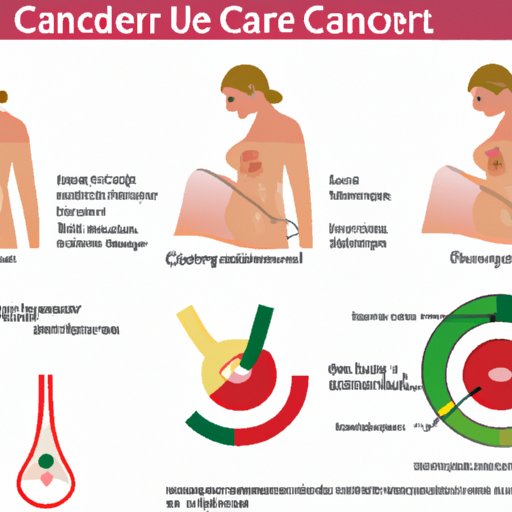
Introduction
Uterine cancer or endometrial cancer is a type of cancer that affects the uterus or the womb. This cancer develops in the lining of the uterus, which is called the endometrium. According to statistics, uterine cancer is the fourth most common cancer in women worldwide and is seen mostly in women over the age of 50.
Early detection is key to treating and preventing uterine cancer from progressing. It is therefore essential for women to be aware of the signs and symptoms of the disease and seek medical attention when needed.

10 Signs That May Indicate Uterine Cancer and When to Get Tested
Here are ten signs that may indicate the presence of uterine cancer:
Pain or discomfort in the pelvic area
Pain or discomfort in the pelvic area that lasts for several weeks or months can be a sign of uterine cancer. This pain may be present either in the lower abdomen or in the lower back or hip area.
Abnormal vaginal bleeding
Abnormal vaginal bleeding or spotting is usually the first and most common sign of uterine cancer. This can be anything from heavy periods, bleeding in between periods, or post-menopausal bleeding, which is bleeding that occurs after you have stopped menstruating for at least one year. If you experience any type of abnormal vaginal bleeding, you must seek medical attention straight away.
Pain during sexual intercourse
Women with uterine cancer may experience pain during sexual intercourse. This may be accompanied by a feeling of pressure or discomfort in the pelvic region.
Abnormal vaginal discharge
Watery or bloody vaginal discharge, particularly if it has an unpleasant odor, can indicate uterine cancer. If you experience any unusual discharge, it is best to get it checked by a doctor.
Difficulty urinating
Difficulty urinating or frequent urination can also be a sign of uterine cancer, particularly if this occurs together with other symptoms such as pelvic pain or bleeding.
Loss of appetite or rapid weight loss
A sudden loss of appetite or rapid weight loss without any apparent reason may be an indication of uterine cancer. You may find it harder to eat due to pain or discomfort.
Fatigue
Unexplained fatigue or weakness that is not relieved by rest or sleep can be a sign of uterine cancer. Some people may experience a general lack of energy or feel tired all the time.
Anemia
Anemia is a condition where there’s a lack of red blood cells which can cause you to feel fatigued. The cause of anemia could be chronic bleeding from uterine cancer, although anemia alone shouldn’t lead to an immediate assumption that you have uterine cancer. Any unusual and sustained symptoms should be discussed with a medical professional.
Enlarged uterus
Women with uterine cancer may experience an enlargement of the uterus, which is usually detected during a physical exam. This may present as your belly looking and feeling bloated or larger than usual, which is best addressed through a professional medical examination or scan.
Abdominal swelling or bloating
Abdominal swelling or bloating, which is not associated with eating, can also be a sign of uterine cancer. The swelling may be accompanied by a feeling of fullness and discomfort.
Detecting the Early Symptoms of Uterine Cancer: A Complete Guide
Early detection of uterine cancer can help increase your chances of successful treatment. This involves being aware of the symptoms and regularly monitoring your health.
Regular gynecological check-ups and tests for early detection
Your gynecologist can help detect any abnormalities in the uterus. Regular vaginal exams and Pap tests, which are routine cervical screenings, can identify any changes in the cervix or the connecting tissues that may lead to uterine cancer.
Self-awareness and monitoring symptoms
Pay attention to your body and know what is normal for you. If any usual symptoms present themselves, track their duration and intensity. If these symptoms persist or worsen, or if new symptoms arise, call your gynecologist for an appointment.
What Women Should Know About the Symptoms of Uterine Cancer
Uterine cancer develops when cells in the endometrium start growing out of control. Here are some risk factors that increase the incidence of this type of cancer:
Understanding the symptoms
Uterine cancer is more common in elderly, postmenopausal women. Women who have a family history of endometrial cancer or have inherited changes in the genes that cause Lynch Syndrome, a genetic disorder that significantly increases the risk of developing several types of cancer. Women diagnosed with Polycystic Ovary Syndrome (PCOS) diagnosed or who have had radiation therapy or tamoxifen to treat breast cancer may also be at risk of developing this type of cancer.
Importance of understanding the symptoms
By understanding the symptoms of uterine cancer, you can increase your chances of early detection and treatment, which is why it is important to be aware of the associated risk factors.
Uterine Cancer Symptoms Every Woman Should Be Aware Of
Women should be aware of the following symptoms related to uterine cancer:
Explanation of the most common symptoms
As previously mentioned, the most common symptom of uterine cancer is abnormal vaginal bleeding or discharge. Other symptoms may include pelvic pain, swollen abdomen, frequent urination, difficulty passing urine, or constipation. However, many people may not manifest symptoms in the early stages of the disease, making regular screenings all the more important.
Importance of seeking medical attention if experiencing any of the symptoms
If you experience any of the symptoms mentioned above, it’s vital that you seek medical attention right away. While many of these may not indicate cancer and may instead be related to other disorders, only a doctor can make a diagnosis and recommend an effective and safe course of treatment.
Unveiling the Most Common Symptoms of Uterine Cancer: A Helpful Guide
A detailed breakdown of the most common symptoms can aid in spotting the warning signs of uterine cancer:
Detailed explanation of each symptom
- Abnormal vaginal bleeding or discharge – this could include spotting between periods, heavy periods, or bleeding after menopause
- Pain or discomfort in the pelvic area that is persistent and lasts more than two weeks
- Swelling in the abdominal area due to an enlarged uterus
- Loss of appetite or sudden weight loss unrelated to dieting or exercise
- Unexplained fatigue or weakness
- Difficulty urinating or incontinence
- Anemia or low red blood cell count
How the symptoms may vary from person to person
Uterine cancer symptoms can present differently from person to person and are generally nonspecific. This means many of the symptoms listed could also suggest a range of other conditions or diseases. Some people may even have no symptoms at all, making it important to undergo regular check-ups and screenings.
Importance of seeking medical attention immediately
If you have any symptoms related to uterine cancer, it’s essential that you seek medical attention immediately. Your healthcare provider can help determine the cause of the symptoms, and if necessary arrange for further testing.
Are You at Risk for Uterine Cancer? Here’s How to Identify Its Symptoms
Here are some factors that could increase your risk of developing uterine cancer:
Explanation of risk factors
Factors that increase the likelihood of developing uterine cancer include obesity, not having children, having an early menstruation onset, or entering menopause at an older age. Women who have previously undergone radiation therapy, have a history of unopposed estrogen therapy, or Polycystic Ovary Syndrome(PCOS) tend to be at increased risk for the disease.
Warning signs and when to seek medical attention
If a woman experiences abnormal vaginal bleeding, is over the age of 50, has a family history of uterine cancer, obesity, or has prior treatment with hormones, she should alert her medical care provider and schedule an appointment for a pelvic exam as soon as possible.
The Warning Signs of Uterine Cancer and How to Seek Medical Attention
It is critical to seek medical attention immediately if you experience any signs or symptoms related to uterine cancer. Your healthcare provider can perform a series of tests to determine if you have the disease, including:
Importance of seeking medical attention immediately
With uterine cancer, early diagnosis and treatment are crucial to increasing your chances of successful recovery. If you are experiencing any of the symptoms related to this type of cancer, schedule an examination with your healthcare provider as soon as possible to get a proper diagnosis and begin a course of treatment.
- Endometrial biopsy – a small sample of tissue is taken from the endometrium and sent to a lab for analysis
- Transvaginal ultrasound – this test uses sound waves to create images of the uterus
- Magnetic resonance imaging(MRI) – a scanner creates detailed images that indicate the size, location, and spread of tumors
- Computed tomography(CT) scan – this test uses X-rays to create detailed images that show the size and location of tumors
Treatment options for uterine cancer
Treatment options for uterine cancer include surgery, radiation therapy, chemotherapy, and hormonal therapy, depending on the stage and severity of the disease at the time of diagnosis and any other underlying health issues present. It’s best to discuss these options with your healthcare provider, who can help guide you towards the most appropriate treatment plan.
Conclusion
Uterine cancer can affect any woman, but it is possible to detect and treat it early. If you are experiencing any of the above symptoms or are concerned about your risk for developing uterine cancer, talk to your healthcare provider. Engaging in regular check-ups and screenings can help improve your chances of early detection and successful treatment.





